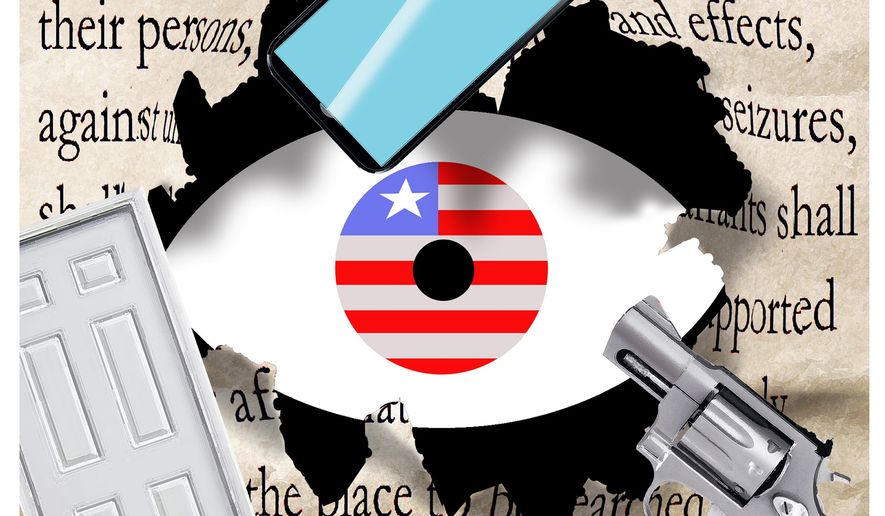OPINION:
Every move you make
And every vow you break
Every smile you fake
Every claim you stake
I’ll be watching you
— “Every Breath You Take,” The Police
The Fourth Amendment to the Constitution guarantees the right to privacy. Like other amendments in the Bill of Rights, it doesn’t create the right; it limits government interference with it.
Shortly before he announced his withdrawal from the presidential race, President Biden misquoted Justice Antonin Scalia, suggesting that Scalia believed that the Bill of Rights creates rights. As Scalia wrote, reflecting his view on the origins of all personal liberty, the Bill of Rights secures rights, it doesn’t create them; it protects them from the government.
Those who drafted the Bill of Rights recognized that human rights precede politics. They precede the existence of the government. They come from our humanity.
The idea that rights come from our humanity is the essence of natural law theory, which was first articulated by Aristotle in 360 B.C.
Natural law teaches that right and wrong are discoverable by the exercise of reason and there are areas of human behavior — the exercise of rights — that are immune from government interference.
Aristotle’s views would later be refined by Cicero, codified by St. Thomas Aquinas, explained by John Locke, woven into Anglo-American jurisprudence by British and American jurists and immortalized in the Declaration of Independence by Thomas Jefferson.
Thus, our rights to be alive, to think as we wish, to say what we think, to publish what we say, to worship or not, to associate or not, to assemble with others, to defend ourselves from crazies and tyrants, to travel, to own property and to be left alone are all hard-wired into human nature. Nature is the means through which God passes his gifts along to us. We come about by a biological act of nature. God’s greatest gift to us is life, and he tied that gift to free will. Just as God is perfectly free, so are we.
In exercising our free will, we employ rights. Rights are claims against the whole world. They don’t require the approval of government, neighbors or colleagues. The rights exist in everyone no matter their place of birth, and each person exercises them as he or she sees fit. The government should enter the picture only when someone violates another’s natural rights.
So if someone builds a house in your backyard without your consent, you can knock it down and expel the builders or you can ask the government to do so.
Suppose the builders haven’t consented to the existence of the government. That does not absolve them. Though government is moral and legal only in a society in which all have consented to it — this is Jefferson’s “consent of the governed” argument in the declaration — the only exception to actual consent is the legitimacy of employing government to protect natural rights.
Professor Murray Rothbard modernized natural law theory in part with his nonaggression principle: Initiating or threatening force or deception against a person or his rights is always morally illicit. This applies to all aggression, especially aggression from the government. Those building a house in your backyard have either used force or deception to get there. Both violate your natural rights and thus the nonaggression principle.
Now, back to the Fourth Amendment and privacy. In a famous dissent in 1928, which two generations later became the law of the land, Justice Louis Brandeis argued that government surveillance constitutes a search under the Fourth Amendment and thus cannot be conducted by the government without a warrant issued by a judge. He famously called privacy the right most valued by civilized people and described it as “the right to be let alone.”
Today, this is the most violated of personal rights — not by judges signing search warrants for surveillance, but by governments ignoring and evading the natural right to privacy and pretending that the Fourth Amendment does not apply to them. The linchpin of the amendment is the judicial determination of the existence of probable cause — meaning that it is more likely than not that a crime has been committed, and that evidence of that crime is in the place to be searched and in the things to be seized.
Today, the feds — and this has been picked up and mimicked by local and state governments — have convinced themselves that as long as they claim they are looking for threats to national security, they needn’t follow the Fourth Amendment.
Today, the government rarely bothers to obtain a search warrant for surveillance because it is cumbersome to do so and because it is so easy to surveil on a massive scale without one — and worry about the Fourth Amendment afterward.
Today, the National Security Administration — the federal government’s 60,000-person domestic spying apparatus — captures every keystroke on every desktop and mobile device, and every conversation on every landline and mobile device, and all data transmitted into, out of or within the United States without search warrants.
You’d be hard-pressed to find a geographic area that is not covered by police using StingRay hardware, which tracks the movement and use of mobile phones. When Edward Snowden passed the facts of massive warrantless spying in the Bush and Obama administrations to journalists in Hong Kong, he had them put their mobile devices in his hotel room refrigerator, since anywhere else would have alerted his former colleagues of their collective whereabouts.
The government spends hundreds of billions of dollars annually just to watch and follow us. Who authorized this? Why do we tolerate it? What kind of society hires a government to secure rights and then watches it destroy them?
• To learn more about Judge Andrew Napolitano, visit https://JudgeNap.com.




Please read our comment policy before commenting.